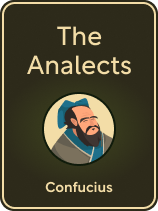

This article is an excerpt from the Shortform book guide to "The Analects" by Confucius. Shortform has the world's best summaries and analyses of books you should be reading.
Like this article? Sign up for a free trial here.
Why is it important to be honest? Is honesty just about telling the truth?
In The Analects, Confucius offers direct advice about morality. He says that a single word can guide everything you do: the Chinese word “shu,” which means that you should treat others in the same way you want to be treated. One key aspect of this principle is honesty.
Keep reading to learn about the importance of honesty in life.
The Importance of Honesty
Why is it important to be honest? Confucius teaches that honesty is a key part of proper conduct; a good person must be trustworthy. When Confucius discusses honesty, he doesn’t just mean not telling lies. You should also try to be honest in your thoughts. In other words, avoid unfair biases; strive to see people, things, and situations as they are instead of as you expect (or want) them to be.
(Shortform note: In Meditations, Aurelius offers some advice on how to avoid biased thoughts. He suggests that you practice identifying things by thinking about their component parts—for instance, if you see a beautiful painting, you could identify it as simply an arrangement of colored paints on a piece of canvas. By doing so, you disrupt whatever emotional response you would normally have to that painting, allowing you to remain logical and unbiased.)
Honesty also means being frank about your skills and knowledge: Don’t inflate your abilities, but don’t sell yourself short, either. In short, know your own worth and be honest about it. For example, don’t pad your resume with skills or experience you don’t have, but don’t accept a job you’re overqualified for—find a job that will make use of your skills and pay you fairly for them.
To avoid accidentally telling lies, Confucius recommends not talking about your plans or goals because you’ll be ashamed if your actions don’t live up to your words. Instead, take action first, and only talk about it afterward. For instance, a boxer who says that he’s going to be a world champion will feel ashamed if he never reaches that goal, even though he intended to become the champion and tried his hardest to do so.
(Shortform note: As a counterpoint to Confucius, publicly announcing what you intend to do can create a strong motivation to do it. In Awaken the Giant Within, self-help author Tony Robbins suggests telling your friends or family about your goals because that creates pressure—people will hold you accountable as you work toward your goals. They’ll hopefully cheer you on, too.)
Finally, Confucius says that an honest person must avoid hypocrisy. He suggests that you ask yourself at the end of each day whether you gave any advice that you don’t personally follow. If so, change either your actions or your teachings so that you can avoid such hypocrisy in the future.
(Shortform note: Hypocrisy—discrepancies between what you think or say and what you do—could come from contradictions in your morals that you’re not aware of. For example, you might believe that violence is always wrong but find yourself in a situation where you have to fight in self-defense. At that moment, you’d realize that your belief in pacifism conflicts with your desire to protect yourself. Note that this hypocrisy doesn’t mean you’re a bad person; it just means that you need to reexamine your beliefs and consider whether there are situations in which it’s appropriate to do the thing you usually avoid.)
| Find Your Purpose Through Honesty Confucius discusses being honest with yourself so you can find jobs, relationships, and so on that suit your needs and abilities. In Ikigai, the authors go a step further; they say that you can find your purpose in life by asking yourself four questions and answering them honestly: 1. What do I love? 2. What am I good at? 3. What does the world need? 4. What can I get paid for? If you can find something that answers all four questions, you’ll have found your ikigai—your purpose, or reason for being. |

———End of Preview———
Like what you just read? Read the rest of the world's best book summary and analysis of Confucius's "The Analects" at Shortform.
Here's what you'll find in our full The Analects summary:
- A collection of Confucius's teachings compiled by his students
- Lessons about how to be a good learner, person, and leader
- Concrete methods for putting Confucius’s teachings into practice






